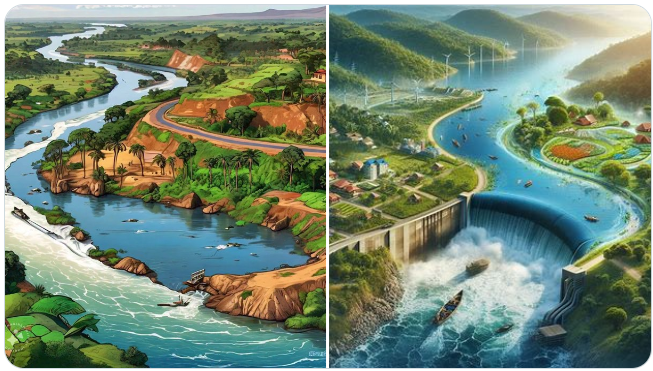By LJDemissie
September 14, 2024
 Climate change is an urgent global challenge, and one of the critical aspects of addressing it is the conservation of fresh water. Fresh water is a precious resource, yet vast amounts are wasted as they flow into the oceans. This not only depletes fresh water supplies but also contributes to rising sea levels, threatening coastal communities. One significant example is the Abay River of Ethiopia, whose waters are underutilized due to various geopolitical and developmental challenges.
Climate change is an urgent global challenge, and one of the critical aspects of addressing it is the conservation of fresh water. Fresh water is a precious resource, yet vast amounts are wasted as they flow into the oceans. This not only depletes fresh water supplies but also contributes to rising sea levels, threatening coastal communities. One significant example is the Abay River of Ethiopia, whose waters are underutilized due to various geopolitical and developmental challenges.
The Abay River: An Untapped Resource
The Abay River, also known as the Blue Nile, is a vital water source for several countries in East Africa. However, much of its water is lost to the sea because it is not adequately developed for power generation, irrigation, and other purposes. A significant barrier to this development is the reluctance of downstream countries, particularly Egypt, to cooperate with upstream nations.
Historical Context and Current Challenges
Egypt’s position is grounded in historical agreements, which Ethiopia rejected and denounced at its inception, notably the colonial-era treaty between Egypt and Britain, which granted Egypt the lion’s share of the Nile’s waters. This legacy is evident in the Abay River’s water allocation, where Egypt, despite contributing zero water, receives 59%, Sudan receives 29%, and Ethiopia, the river’s sole contributor, is allotted a mere 11%. Almost all now consider this treaty outdated and null, yet its provisions continue to shape Egypt’s stance. Egyptian leaders have been reluctant to renegotiate water usage terms, hindering progress and development in upstream countries, including Ethiopia.
The Case for Sustainable Development
Building dams and other infrastructure in upstream countries like Ethiopia can provide numerous benefits without compromising the water needs of downstream nations such as Egypt and Sudan. These benefits include:
- Power Generation: Hydroelectric dams can generate renewable energy, reducing reliance on fossil fuels and contributing to climate change mitigation.
- Irrigation: Improved irrigation systems can enhance agricultural productivity, ensuring food security for millions.
- Flood Control: Dams can help manage water flow, reducing the risk of floods and droughts.
- Economic Benefits: Sustainable development of the Abay River’s waters can create jobs, stimulate economic growth, and attract investment.
Upholding International Laws and Cooperation
It is crucial to approach this issue with respect for international laws governing transboundary rivers. Cooperation and dialogue among all Nile Basin countries are essential to ensure fair and equitable use of the river’s resources. By working together, these nations can develop sustainable solutions that benefit all parties involved.
A Call for Change
While it is important to acknowledge Egypt’s historical concerns, it is equally important to recognize the need for progress and adaptation to current realities. Egypt’s leaders must reconsider their stance and engage in constructive dialogue with upstream countries. By doing so, they can contribute to regional stability, economic development, and the global fight against climate change.
In conclusion, the development of the Abay River’s waters presents a unique opportunity to conserve fresh water, generate renewable energy, and combat climate change. It is time for all Nile Basin countries to come together, uphold international laws, and work towards a sustainable and prosperous future for all.
–
The writer, LJDemissie, can be reached at LJDemissie@yahoo.comor @LJDemissie (Twitter).


















